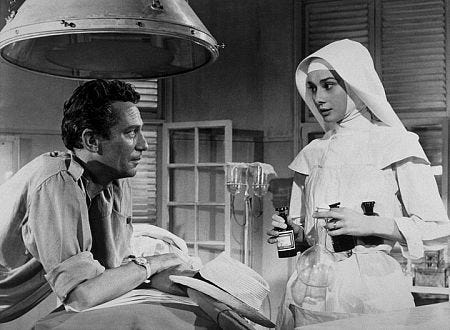modelcampusa.com – “The Nun’s Story,” released in 1959 and directed by Fred Zinnemann, is a compelling drama that delves into the complexities of faith, duty, and personal struggle. Based on the novel by Kathryn Hulme, the film stars Audrey Hepburn in one of her most powerful and nuanced performances. The film is set against the backdrop of pre-World War II Europe and Africa and tells the true story of a Belgian nun’s spiritual and personal journey.
Plot and Characters
The film follows Gabrielle Van der Mal (played by Audrey Hepburn), a young Belgian woman who joins a convent and becomes Sister Luke. Driven by a desire to serve as a nurse in the Congo, Sister Luke faces numerous challenges as she navigates the strict rules of convent life and her own inner conflicts. The story takes viewers through her journey from the cloistered life of the convent to her work in the Belgian Congo and back to Europe during the tumultuous years leading up to World War II.
Critical Acclaim and Impact
“The Nun’s Story” was met with critical acclaim upon its release, praised for its thoughtful storytelling and Hepburn’s remarkable performance. The film received several Academy Award nominations, including Best Picture and Best Actress for Hepburn. Its portrayal of the deep questions of faith and personal sacrifice resonated with audiences and critics alike, cementing its place as a significant film in the exploration of religious life.
Themes and Legacy
The film explores themes of obedience, faith, and the struggle between personal desires and religious duties. It offers a profound look at the human condition and the complexities faced by those who choose a life of religious devotion. “The Nun’s Story” remains a poignant and thought-provoking film that continues to engage viewers with its exploration of spiritual and personal dilemmas.
In conclusion, “The Nun’s Story” (1959) stands as a powerful narrative about the search for meaning and identity within the confines of religious life. Audrey Hepburn’s captivating portrayal and the film’s insightful exploration of faith and conflict make it a timeless classic in cinematic history.
